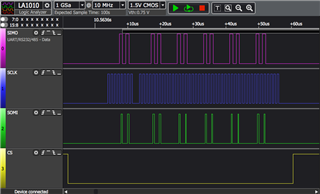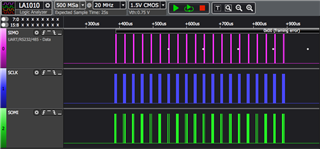Hello,
I'm trying to interface msp430fr5994 to nrf51822 as spi slave with soft device 110 and SDK v10. The master (msp40) sends 20 bytes to the slave (nrf51). The issue is that the salve (nrf51) is not receiving anything when I check "NRF_DRV_SPIS_XFER_DONE". I set up the master spi clock to 1MHz, spi mode, and the bit order to be the same on both (master and slave). Also, I I at the beginning of the transmission, I used 7500 ns delay after driving the CS low and then starting the *** in the master. At the end of the transmission, I stoped the master clock and delay for 2400ns before driving CS high. I checked spi_init on the nrf and it seems to be set properly. I'm really struggling to get it the spi to work. what did I miss?
Here is nrf code:
#define TX_BUF_SIZE 20u /**< SPI TX buffer size. */
#define RX_BUF_SIZE TX_BUF_SIZE /**< SPI RX buffer size. */
static volatile bool receiving_completed = false; /**< A flag to inform about completed receiving. */
static nrf_drv_spis_t const m_spis = NRF_DRV_SPIS_INSTANCE(SPIS_INSTANCE_NUMBER);
static uint8_t m_tx_buf[TX_BUF_SIZE]; /**< SPI TX buffer. */
static uint8_t m_rx_buf[RX_BUF_SIZE]; /**< SPI RX buffer. */
/**@brief Function for application main entry.
*/
int main(void)
{
uint32_t err_code;
err_code = spi_slave_init();
APP_ERROR_CHECK(err_code);
// Enter main loop.
while(1)
{
if (receiving_completed)
{
receiving_completed =false;
//Set buffers to recevied new data
err_code = nrf_drv_spis_buffers_set(&m_spis, m_tx_buf, sizeof(m_tx_buf), m_rx_buf, sizeof(m_rx_buf));
APP_ERROR_CHECK(err_code);
}
}
}
uint32_t spi_slave_init(void)
{
uint32_t err_code;
nrf_drv_spis_config_t spis_config = NRF_DRV_SPIS_DEFAULT_CONFIG(SPIS_INSTANCE_NUMBER);
spis_config.miso_pin = SPIS_MISO_PIN;
spis_config.mosi_pin = SPIS_MOSI_PIN;
spis_config.sck_pin = SPIS_SCLK_PIN;
spis_config.csn_pin = SPIS_CS_PIN;
spis_config.mode = NRF_DRV_SPIS_MODE_0;
/*
NRF_DRV_SPIS_MODE_0 -----> (CPOL = 0, CPHA = 0)
NRF_DRV_SPIS_MODE_1 -----> (CPOL = 0, CPHA = 1)
NRF_DRV_SPIS_MODE_2 -----> (CPOL = 1, CPHA = 0)
NRF_DRV_SPIS_MODE_3 -----> (CPOL = 1, CPHA = 1)
*/
spis_config.bit_order = NRF_DRV_SPIS_BIT_ORDER_MSB_FIRST;
err_code = nrf_drv_spis_init(&m_spis, &spis_config, spi_slave_event_handle);
APP_ERROR_CHECK(err_code);
//Initialize buffers.
spi_slave_buffers_init(m_tx_buf, m_rx_buf, (uint16_t)TX_BUF_SIZE);
//Set buffers.
err_code = nrf_drv_spis_buffers_set(&m_spis, m_tx_buf, sizeof(m_tx_buf), m_rx_buf, sizeof(m_rx_buf));
APP_ERROR_CHECK(err_code);
return NRF_SUCCESS;
}
static void spi_slave_event_handle(nrf_drv_spis_event_t event)
{
if (event.evt_type == NRF_DRV_SPIS_XFER_DONE)
{
//Check if buffer size is the same as amount of received data.
APP_ERROR_CHECK_BOOL(event.rx_amount == RX_BUF_SIZE);
if (event.rx_amount == RX_BUF_SIZE)
{
// Inform application that receiving is completed.
receiving_completed = true;
}
}
}




